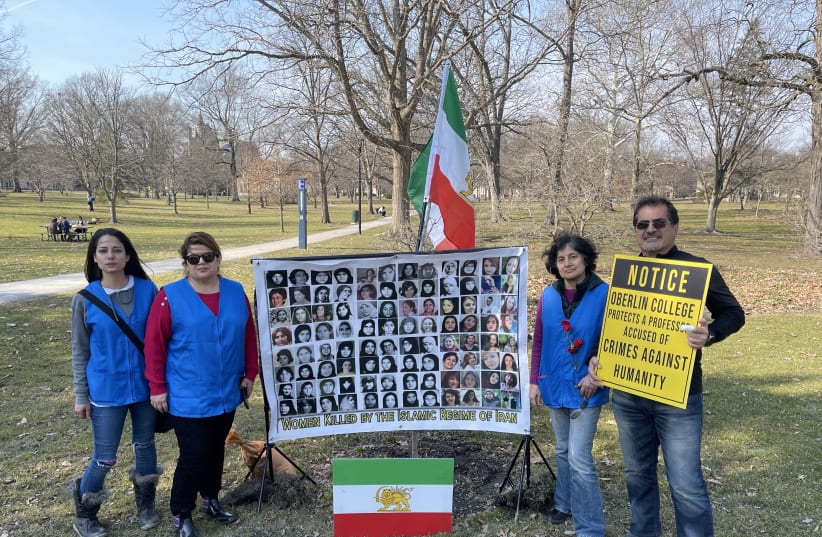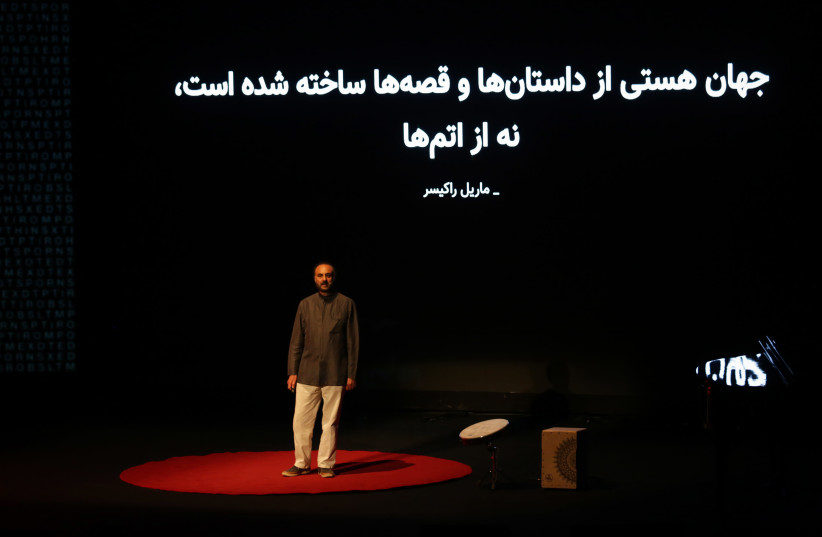The US-based organization the Alliance Against Islamic Regime of Iran Apologists provided damning new evidence to Amnesty International for its new report on Oberlin College Professor of Religion Mohammad Jafar Mahallati’s alleged role in the cover-up of the massacre of at least 5,000 Iranian dissidents in 1988.
Amnesty’s report titled “Involvement of Iran’s former diplomats in covering up the 1988 prions massacres” was released on February 6.
According to the findings of Amnesty’s 17-page report, ”Iran’s then Permanent Representative to the UN in New York, Mohammad Jafar Mahallati, played a particularly active role in seeking to undermine credible reports by the then UN Special Rapporteur on the situation of human rights in Iran, and Amnesty International, and to weaken the UN’s response. For instance, he undertook efforts in late November and early December 1988 to block the adoption of a resolution by the UN General Assembly that expressed concern about the mass executions.”
”Iran’s then Permanent Representative to the UN in New York, Mohammad Jafar Mahallati, played a particularly active role in seeking to undermine credible reports by the then UN Special Rapporteur on the situation of human rights in Iran, and Amnesty International, and to weaken the UN’s response. For instance, he undertook efforts in late November and early December 1988 to block the adoption of a resolution by the UN General Assembly that expressed concern about the mass executions.”
Amnesty International
Mahallati, who teaches Islam at the Ohio-based Oberlin College, was the Islamic Republic of Iran’s UN ambassador from 1987-1989.
The story of Oberlin College's Mahallati and his denial of mass executions
Despite Amnesty International's urgent warnings sent to Iran’s regime at the time and media coverage about the massacre, “Mahallati denied all reports of mass executions” during 1988, wrote the human rights group.
“Amnesty International notes with gratitude that it obtained some of the media articles cited in this annex from the Alliance Against Islamic Regime of Iran Apologists, a group of former prisoners, victims’ relatives and human rights activists who launched a public campaign in October 2020 to seek accountability for Iranian officials who denied or distorted the truth about the mass executions of 1988,” wrote the authors of the Amnesty report.
Hamid Charkhkar, a professor of biomedical engineering at Case Western Reserve University in Cleveland and a member of the Alliance Against Islamic Regime of Iran Apologists (AAIRIA), uncovered a crucial Financial Times article from Aug. 17, 1988, that stated, "Iran has resorted to mass executions of political prisoners." The article added, "systematic executions of leftist prisoners, both Marxist and Islamic … greatly accelerated… particularly since the incursion into Western Iran by Iraqi-backed Islamic leftists (People’s Mujahedin)."
Amnesty and AAIRIA argue that Mahallati should have had knowledge about the mass executions due to the Financial Times article, additional media reports at the time, and Amnesty’s urgent warning notices sent to Iran’s regime in 1988.
AAIRIA also revealed the self-immolation of Iranian dissident Mehrdad Imen protesting the 1988 massacre in front of the UN and obtained pictures of demonstrators in front of the UN seeking to draw attention to the mass murders unfolding in Iranian prisons in 1988.
The Iranian’s regime 1988 execution spree targeted Iranians affiliated with the Mojahedin-e Khalq Organization ( MEK), the left-wing parties Tudeh Party and Fadaiyan Khalq Organization (FKO), as well as the Kurdish organizations (Komala and the Kurdish Democratic Party of Iran).
“In light of this new evidence, we conclude with certainty that Mr. Mahallati was aware of the executions and was in a position to stop them from happening,” AAIRIA said in statement, adding that “We find him negligent and complicit for failing to use his position at the UN to draw public attention to the Islamic Regime or Iran’s crimes against humanity, prevent further executions, and mislead the UN… We also condemn the college for continually defending a known human rights abuser and failing to meet with the victims’ families, look at their evidence and listen to their stories.”
The refusal by Oberlin College’s president Ambar to meet with the victims’ families and take action against Mahallati has caused outrage among Oberlin alumni and students.
Rebecca McKelvy, who graduated in 2015, told The Jerusalem Post that “As an Oberlin alumna I find the hypocrisy exhibited by the college to be a disgusting embarrassment. Oberlin has long purported to fight for justice, but apparently that passion to protect human rights has its limitations. Now the college continues to employ Prof. Mahallati, a man who knowingly covered up heinous war crimes, even now that Amnesty has published the evidence of his lies and atrocities.”
“As an Oberlin alumna I find the hypocrisy exhibited by the college to be a disgusting embarrassment. Oberlin has long purported to fight for justice, but apparently that passion to protect human rights has its limitations. Now the college continues to employ Prof. Mahallati, a man who knowingly covered up heinous war crimes, even now that Amnesty has published the evidence of his lies and atrocities.”
Rebecca McKelvy
She added that “I have received no word back from President [Carmen Twillie] Ambar or the board of trustees, all who continue to protect him without an ounce of shame. The fact that someone as evil as Mahallati sits in a comfy Oberlin office on payroll is a disgrace to the college and stains the reputation of anyone associated with the now cowardly, hypocritical institution.“
Jerold S. Auerbach, a professor Emeritus of History at Wellesley College, told the Post that Mahallati “degrades Oberlin—and himself.” Auerbach graduated from Oberlin College in 1957 and is an internationally distinguished historian.
The lead organizer of AAIRIA’s campaign, Lawdan Bazargan, is an Iranian-American human rights activist whose 29-year-old brother, Bijan, was executed by the regime in 1988 for his leftist views. Mahallati lashed out at Bazargan in a Voice of America interview in 2022 for her efforts to dislodge him from his academic position.
The clerical regime incarcerated Bazargan in Tehran’s infamous Evin prison for her dissident activities in the 1980’s.
Post press queries to Mahallati were not returned. Oberlin College spokeswoman, Andrea Simakis, told the Post she received its media query but refused to provide a comment. Post press queries to Oberlin College president Ambar went unanswered.
In a 2020 email sent to the Post, Mahallati denied that he covered up crimes against humanity in 1988.
The Post has reported on Mahallati’s call for a violent global jihad against Israel and for the destruction of the Jewish state while serving as the Iranian regime’s ambassador.
The Post disclosed in 2021 that Mahallati incited hatred during his tenure at the UN against the persecuted Bahá'í community in Iran.
The chair of Oberlin’s religion department, Cynthia Chapman, has refused to answer Post press queries about Mahallati’s alleged crimes against humanity, antisemitism and anti-Bahá'í incitement.
On Friday, the Oberlin Review, the student newspaper for Oberlin College, reported “During his tenure as an ambassador for Iran, Mahallati represented Ayatollah Khomeini, founder of the Islamic Republic of Iran.”
Camron Amin, a professor of Middle East studies at the University of Michigan-Dearborn, who is an expert on Iran and Persian history, told the Review about Mahallati’s representation of the Khomeini clerical regime that:
“Ayatollah Khomeini made a number of ruthless decisions, He purged many formerly trusted members of his inner circle, he tightened up the legal power invested in the office he held, and he ended a war that was draining resources the state could use to further suppress dissent. Khomeini’s successor, Ayatollah Khameneh’i, built on this bloody legacy with assassinations of prominent dissidents in Iran and overseas. 1988 was not a bug of the Islamic Republican system, but a feature.”
The Oberlin Review declared in an editorial in November 2021 titled “Evidence Against Mahallati Irrefutable” with respect to his role in covering up the mass executions in 1988. The student paper also noted that “Mahallati’s rhetoric about the Baha’is laid the groundwork for Iran to commit genocide against the Bahai’ community. To this day, Baha’is are systematically persecuted, tortured, and killed in Iran.”
Top Oberlin College Board of Trustee members like Ted Brandt, Founder and Chief Executive Officer of Marathon Capital, and Chris Canavan, a senior advisor at Lion's Head Global Partners, declined to comment about the new Amnesty International report.

